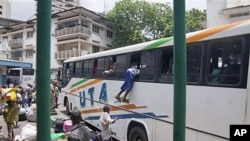The U.N. Security Council is considering tough new measures to press Ivory Coast’s incumbent President Laurent Gbagbo to end months of post-election violence and finally transfer power to his rival Alassane Ouattara, who won the November presidential election.
The U.N. Security Council has repeatedly expressed concern over attacks against civilians in Ivory Coast, where the United Nations says post-election violence has killed at least 462 people and injured scores more. Almost four months of fighting between armed supporters of Gbagbo and Ouattara has also displaced nearly a million people in the country’s commercial capital, Abidjan.
France’s U.N. ambassador, Gérard Araud, told reporters Friday that Abidjan is on the brink of civil war, and action is necessary. He said France and Nigeria have presented the Security Council with a draft resolution intended to help end the crisis, and he explained the measures contained in it.
"It is saying, first, I think, [Laurent] Gbagbo has to leave. Second point, to stop the violence against the civilians, and especially as the French president has declared, we would want to forbid the heavy weapons from the Abidjan area," said Araud. "You may be aware that actually the Gbagbo people have used mortars against civilian neighborhoods, so it is very important to do it. And we also want to go to sanctions against Gbagbo and his close advisers."
Araud said the draft resolution also includes a referral of the situation in Ivory Coast to the International Criminal Court at The Hague. He said the draft would be discussed among the council members next week, but did not say how soon it might come to a vote.
The United Nations has about 10,000 peacekeepers in Ivory Coast, but their efforts to protect civilians have been obstructed by forces loyal to Gbagbo, as the U.N.’s assistant Secretary-General for Peacekeeping, Atul Khare, told the council.
"Young Patriots and security forces loyal to Mr. Gbagbo continue to obstruct UNOCI operations, including by blocking access by UNOCI patrols to areas where clashes between forces loyal to Mr. Gbagbo and supporters of President Ouattara were on-going. In addition, a number of attacks against the United Nations personnel were reported."
UNOCI Is the French acronym by which the mission is known. Khare said those attacks included the abduction of a peacekeeper on March 15. The peacekeeper is still missing.
Ouattara’s U.N. ambassdor, Youssoufou Bamba, appealed to the council to take "rigorous measures" against Gbagbo, saying, if the situation continues, it will lead to an unprecedented humanitarian catastrophe that will affect not just Ivory Coast, but the entire region.
UN Security Council Considers New Measures to End Ivory Coast Violence












